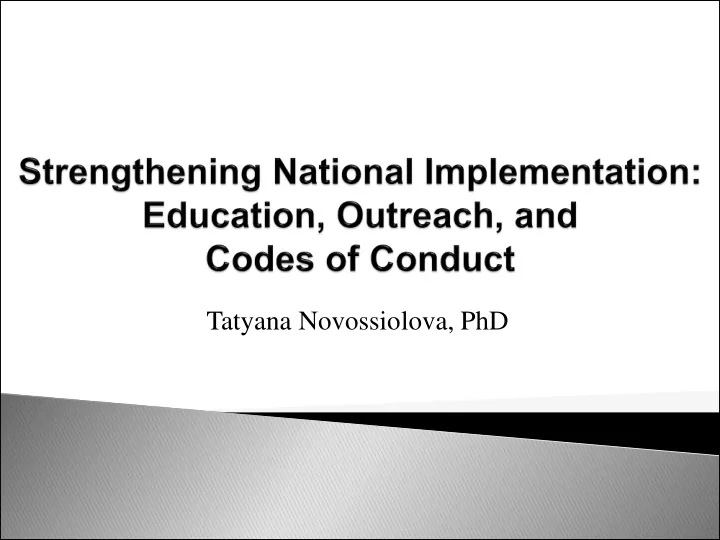

Tatyana Novossiolova, PhD
Article IV: National Implementation 13. The Conference notes the value of national implementation measures…to : (c) promote amongst those working in the biological sciences awareness of the obligations of States Parties under the Convention, as well as relevant national legislation and guidelines; (d) promote the development of training and education programmes for those granted access to biological agents and toxins relevant to the Convention and for those with the knowledge or capacity to modify such agents and toxins; (e) encourage the promotion of a culture of responsibility amongst relevant national professionals and the voluntary development, adoption and promulgation of codes of conduct; [Emphasis added]
The need for biosecurity education has been considered under all three Standing Agenda Items States Parties have systematically recognised and acknowledged the essential role of biosecurity education for achieving the full and effective implementation of the BTWC Working Papers with proposals regarding the need for biosecurity education, outreach, and codes of conduct have been put forward throughout the Intersessional Process, 2012-2015
Educational Module Resource (University of Bradford): 21 lectures on biosecurity available in 10 languages, including Georgian, Russian, Romanian/Moldovan, and Urdo. National Series (University of Bradford): country-specific material on biosecurity and dual use – Armenia, Azerbaijan, Georgia , Kazakhstan, Kyrgyzstan, Tajikistan , Ukraine , and Uzbekistan. EU CBRN CoE Project 3, ‘Knowledge Development and Transfer of Best Practice on Biosafety, Biosecurity, and Biorisk Management’. EU CBRN CoE Project 18, ‘International Network of Universities and Institutes for Raising Awareness on Dual- Use Concerns in Biotechnology’.
National survey on education of biosafety, biosecurity, and dual use – 2010 Launch of th Bradford National Series – Ukraine (two regional seminars) Participation in both EU CBRN Centres of Excellence Project 3 and 18. Project P633, ‘Education and Awareness - Raising in Ukraine’, 2014-2017
Objective: to develop a nation-wide network of experts, lecturer, and educators on biosafety, biosecurity, and bioethics. Methodology: organisation of international and regional seminars; translation of education materials; holding train-the- trainer courses; development of recommendations for the promotion of biosafety and biosecurity curricula. Implementing Bodies: Palladin Institute of Biochemistry, Kiev and the Ukrainian Biosafety Association Sponsors: UK Ministry of Defence
P633, ‘Education and Awareness - Raising in Ukraine’
Jointly funded Easy-to-adapt by Canada and content based the UK under on active the Global learning Appendix with Easy-to-replicate Partnership additional format suitable educational for train-the- An open-source resources and trainer courses Two Appendices book freely policy documents with detailed available online in facilitation notes different languages: and guidance on e.g. Arabic, English, course Russian, development Ukrainian ... http://www.bradford.ac.uk/social-sciences/peace- studies/research/publications-and-projects/guide-to-biological-security- issues/
17-20 May 2016, Kiev A Guide 21 participants from Chapter different universities and institutes in Ukraine = 4 teams TBL Goal: Understand how to use the materials for Understanding and training and reflect Application of upon how to a Key Concept implement them further.
Each trainer is expected to design, plan, and organise a lecture/seminar/course at their own institute and invite the project coordinators to audit it. Project participants are expected to share feedback and lessons learned both from the training and from their own experience with Team-Based Learning. Development of recommendations for a biosafety and biosecurity curricula. Securing an authorisation for the Guide to Biological Security Issues as a reference biosecurity textbook
• Biosecurity education and awareness-raising • IFBA Professional Certification in Biosafety, Biosecurity, and Biorisk Management • Stakeholders engagement: academia, professional associations, industry, government, and international organisations
An interactive seminar, ‘Dual -Use Bioethics: Responsible Science in 21 st Century’ for high school students (age: 16-17 years) Held on 9 June 2016 at First English Language School, Sofia, Bulgaria 32 participants = 6 teams Goal: to engage prospective science students with issues of responsible science and biosecurity
Nuclear Security Education IAEA International Nuclear Security Education Network (INSEN) Chemical Security Education Advisory Board on Education and Outreach Biological Security Education Opportunities for the Eighth Review Conference?
Education is an integral element for effective and comprehensive implementation of the Convention Biosecurity education and training are essential requirements for all those engaged in the life sciences States Parties are urged to report annually on activities undertaken nationally on biosecurity education States Parties are encouraged to agree and establish an international standard for biosecurity education States Parties should agree a Biosecurity Education Action Plan with clear guidelines, milestones, and targets to ensure full and comprehensive implementation of the Convention
States Parties should create an international mechanism for funding and coordination of biosecurity education and awareness-raising activities States Parties should promote the establishment of regional institutes for delivery of biosecurity education and training at different levels States Parties should implement plans to move from the present deficiency of biosecurity awareness to a situation in which there is a global biosecurity norm Such advances in biosecurity education will bring benefits to States Parties in both health and security
Thanks so much for your attention! Any Questions? t.a.novossiolova@bradford.ac.uk
Recommend
More recommend